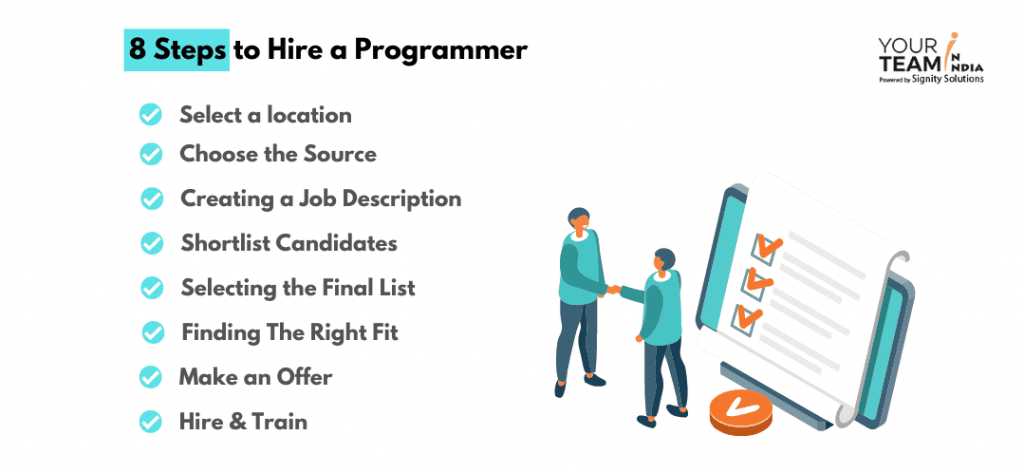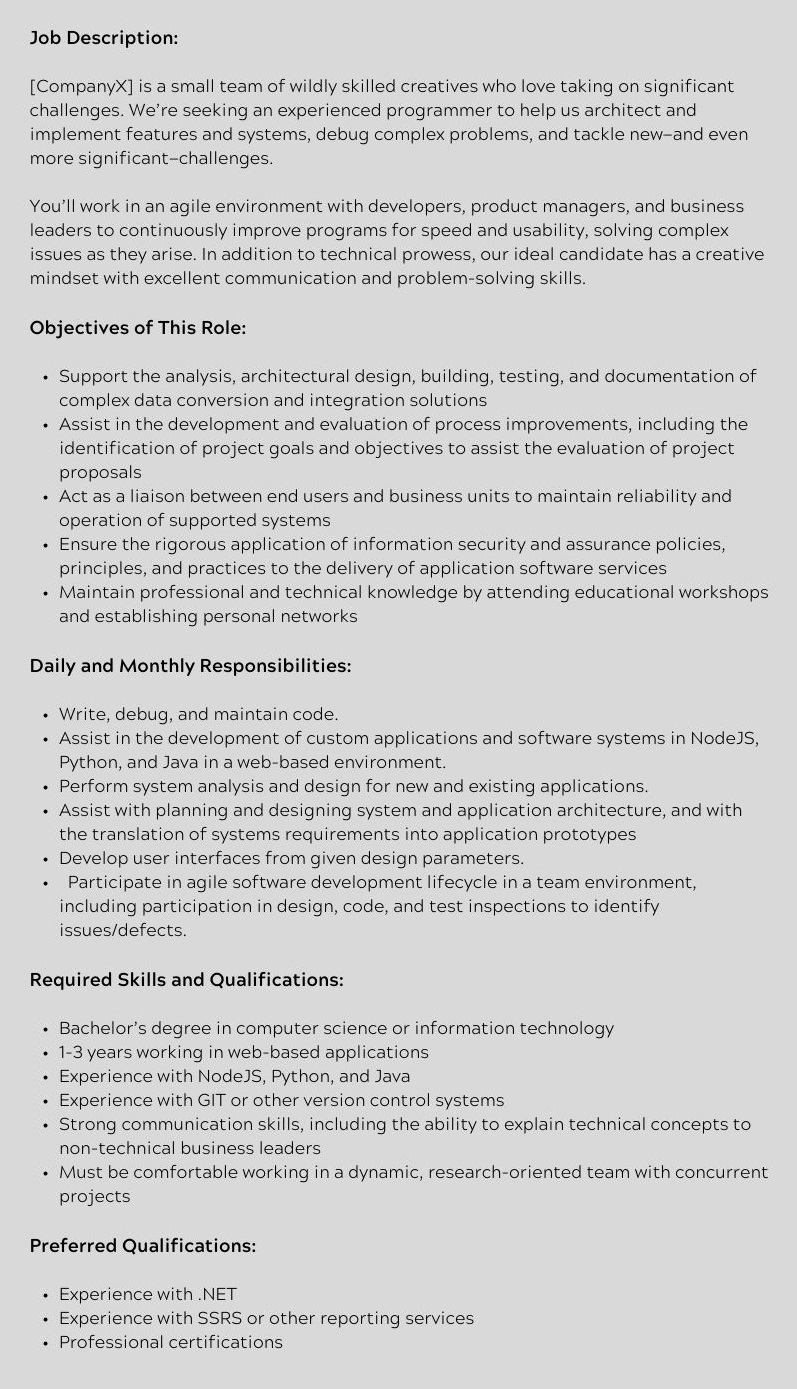Quick Summary: In the rapidly evolving digital landscape of 2026, hiring a programmer has become a critical task for businesses. This comprehensive guide to choose a programmer explores the key steps, considerations, and strategies to successfully recruit and onboard top programming talent in today's competitive market.
In the new normal, we saw a paradigm shift in the modus operandi of businesses. Today offices are no longer seen as a place but have become digital spaces. Business operations are becoming more diverse, evolved, flexible, and hybrid as employees are no longer restricted by physical boundaries.
Many major players have completely gone remote. And by doing so, they can now hire a programmer globally to augment their development team easily.
And if you are one of the businesses that want to avail the benefits of hiring a remote programmer for your IT development but don't know where to start? This comprehensive guide will help you find the right programmers to eliminate the tech-talent shortage you are facing in your local geography.
Before we begin, let's evaluate why businesses today opt for remote developers over in-house ones.
Key Takeaways
- In 2025, the programming landscape is continuously evolving, with new technologies and programming languages emerging. Stay updated on the latest trends and skill requirements to make informed hiring decisions.
- While technical expertise is crucial, don't overlook the importance of soft skills such as communication, problem-solving, and teamwork. Look for programmers who can effectively collaborate and adapt in dynamic environments.
- Explore various sourcing channels like online job platforms, professional networks, offshore development companies, and developer communities. Diversify your recruitment strategy to reach a wider pool of qualified candidates.
Why are Businesses Choosing to Hire a Remote Programmer?
Today western nations are facing a significant resource shortage in the IT sector.
A survey by Manpower Group reported that 46% of US companies are facing a challenge in finding tech talent.
- The hiring cycle in IT has increased to 66 days from 55 days.
- Cyber Security, Big Data, Software Engineers, Artificial Intelligence, Machine Learning, Cloud, Robotics, IoT, or Blockchain are most in-demand.
Factors such as the slow and limited supply of talent in the local market, aging workforce, and the growing demand for skilled workers have forced companies to consider hiring remote teams for their IT needs.
Besides, when compared, the benefits of outsourcing a team of remote programmers outweigh in-house sourcing in many aspects. So, what started as a survival technique has today become the most practical and profitable opportunity for businesses.
Hiring a programmer for your IT development project is a convenient and practical option in 2026. But before you do so, it is important to create a business plan to ensure smooth and hassle-free hiring.
Recommended Read: In-House vs Outsourcing: Pros, Cons and Use Cases
Factors to Consider While Hiring a Programmer
While you may decide to select a programmer for your project, you must consider the following factors:
1. Evaluate your Need to Choose a Programmer
To build a successful plan to find a programmer, you must define the need for the same. You can achieve this by answering the following questions.
Why do you Need a Programmer?
This is the most critical question you must ask yourself before hiring a programmer. Identify the true purpose of hiring a programmer.
- Whether you need the programmer to build a new product or upgrade the existing one?
- What coding language and technology stack should they know?
- Is the programmer to work on a particular aspect, or is it required to develop multiple elements?; thus requiring him to wear multiple hats and have a working knowledge of different operations.
Answering these questions will make your hiring more precise and empower you to find programmers that are the best match for your project.
2. What will be the Priority of Hiring a Programmer?
When developing a software project, you need multiple IT resources that are required to work at different stages of the project. For example, you may need a development architect and coder at the beginning of the project, while the DevOps and QA functions may come later.
It is important to understand the sequence in which the resources are to be deployed on a project to establish the priority of hiring programmers. This will help your HR team focus on priority hiring and fast-track the process.
3. What Experience Does a Programmer Need to be Hired?
When hiring a programmer, it is essential to establish what their experience should be in terms of
- Number of years in the profession
- Number of successful projects delivered in these years?
- Industries that they have worked with in the past?
- Complexity of the projects that they have delivered
Defining these attributes will save you time, effort, and resources in finding and shortlisting candidates.

4. What Skills do you Seek in a Programmer?
Developer skills can be categorized in two ways- technical skills and soft skills. Before you start shortlisting candidates, you must clarify what technical skills the programmer must possess. The technologies they should know, the coding languages they must know, and the development methodology they follow.
One must also evaluate soft skills such as communication, team player, time management, accountability, etc.
You must define skills under:
- Must have- skills without which the candidate should not be hired.
- Desirable- additional skills you want candidates to possess but are not dealbreakers in hiring.
By doing so, you create a clear outline for the HR department and expedite the hiring process.
5. Create Quantifiable Goals
You must define the objectives and milestones that programmers are to deliver. Whether it is building software solutions or enabling cloud migration, the programmers must know what they have to deliver. Creating quantifiable objectives against delivery timelines will streamline your project development.
Following the completion of your business plan for hiring, let's take a look at the steps you need to take to hire a programmer.
Step-By-Step Process to Find a Programmer

The following steps will help you hire the best programmer for your project.
Step 1: Select a location
Location plays a critical role when you have to select a programmer for your project, as it is a major factor that determines the cost of hiring, resource availability, flexibility of operation, etc.
When deciding on the location, you have three options to choose from:
- Onshore: Hiring a programmer from your own country
- Nearshore: Hiring resources from a country with the same or similar work time zone as you.
- Offshore: Hiring from a country that operates offshore in a different work time zone.
When you hire programmers from an onshore or nearshore, you may face the same or similar challenges as hiring in-house resources. The resource crunch we discussed earlier is not limited to just the USA. Most Western countries are facing similar challenges.
So if you are a USA-based company planning to hire from Canada or a UK-based organization wanting to hire from Germany, you will most likely experience higher hiring cycles, expensive resources, and low retention rates.
Hiring programmers from offshore locations with a large IT talent pool, such as India, can help mitigate these challenges. Besides the usual benefits of cost-effective development and unlimited choices, hiring programmers from India gets you around-the-clock development. With your remote programmers working in different time zones, your project is continuously worked on and reviewed, expediting the overall process.
Must Read: Why are Indian Programmers Good to Hire for Programming?
Step 2: Choose the Source
Once you have narrowed it down to a location, the next step is to choose the source for hiring programmers. But, Where to Look When You Want to find a Programmer Online?
You can opt for the following sources while hiring remote programmers.
- Professional Network- LinkedIn is a great source for finding talented programmers. At one glance, you get information on educational background, work experience, and projects the candidate has worked on. LinkedIn jobs provide you access to skilled professionals readily available to work.
- Career Portals- Career portals are a great way to find professionals with varied experience across technologies to choose from for your development project.
- Freelancer Platform- If you are looking to work with a programmer, freelancer listing platforms are a good option to explore talent globally.
- Offshore Development Company- If you are hiring remote programmers, an offshore development company is one of the most reliable sources. As it has a better understanding of the market, it helps you navigate the nuances of hiring remote programmers. Besides, you get access to a large talent pool that has been pre-vetted and assessed on their technical and soft skills. Saving you time and effort in finding candidates.

Step 3: Creating a Job Description
A well-written job description can help you attract good candidates, but the right job description will help you find and select a programmer that best fits your project.
A job description is the first impression that a candidate will have of your organization. Hiring a programmer that best fits your company would require a well-written job description. A clear, concise, and engaging summary of the job opening is a must. If you find it challenging to refine your wording, you can use a sentence rephraser to make your descriptions more polished and compelling.
A Well-written Job Description Includes:
- Candidate’s Educational Qualification
- Expected experience in the field and work portfolio.
- Responsibilities of the job
- Location of the job
- Title of the role
- Your company’s work, mission, vision
- Nature of the project
- Must have skill sets
- Additional nice to have skills
You must include why the candidate should choose your organization. What kind of experience will they get from the project, and what is it like to be part of your company? Describing these aspects will encourage suitable candidates to apply to your posting actively.
Here is a sample of how you can write a job subscription.

Once you have created a job description, share it on sources from where you wish to choose a programmer for your project.
Step 4: Shortlist Candidates
Once you have posted the job description, you will likely get a huge response from different sources. Since the openings are limited, creating a multi-layer assessment is essential to shortlist the right candidates' CVs.
Candidate shortlisting can be divided into three steps:
- CV Mining: CV mining is the step where candidates are shortlisted based on the CV they have shared. You often receive CVs of candidates that are outright unfit for the job in terms of their qualifications, experience, skill sets, geography, etc. These CVs should be eliminated in the first round itself.
- Candidate verification: Once you have identified the candidates that match your requirement in the CV mining round, the next step is to assess if these candidates can be shortlisted further. To verify candidates, you must email programmers who cleared the CV mining round, requesting them to share their work portfolio and experience certificate. This will help filter out those candidates that are not the right fit for the job.
- Assessment Task: Once you have shortlisted the candidates further, send them assessment tasks to gauge their working knowledge and skills. This would be the last round for shortlisting final candidates for the interview round.
Though these tasks may sound easy, evaluating hundreds and thousands of CVs can become time-consuming, error-prone, and tedious, delaying hiring a programmer. Robotic Process Automation is a great way to fast-forward the candidate shortlisting process. You can automate tasks like CV mining, candidate verification, sending assessment tasks, evaluating results, and aligning interviews by deploying a software robot. Processes that would have taken your team weeks or even months can be done in hours by RPA bots.

Step 5: Selecting the Final List
Once you have the list of final shortlisted candidates who cleared all three layers of assessment, the next step is conducting interviews to select a programmer. Interviews are one of the most critical processes of candidate selection and should be conducted by the right people to ensure the right hiring of programmers.
Before you start interviewing candidates to choose a programmer, you must have the answer to the following questions.
What is the right number of interviews? Or how many interviews should be conducted for the job opening?
The number of interviews for a job opening depends on what level/role the programmer is hired. For an entry-level job, two to three rounds of interviews suffice. But when you are hiring a programmer for a managerial position, you need multiple rounds of interviews with technical screening.
Who should conduct these interviews?
Again, this depends on the role you are hiring the programmer for. For entry-level, it is the team leader and project manager who interview the candidate., Still, for senior resources, the interviews are conducted by the head of the department, CTO, and CEO.
How to Interview Programmers for Hire?
When interviewing a programmer, one must evaluate their knowledge, technical skills, learning curve, and attitude toward their work.
To do so, you must create an extensive interview questionnaire and an answer sheet to help the interviewer navigate the interaction in the right direction.
Samples Questions To Evaluate Technical Skills
- How do you find duplicate characters in a string?
- What programming languages do you know? How were your experiences using these languages—which one do you prefer?
- What to you is an unforgivable programming mistake?
- Describe the structure of your last project.
Sample Questions To Evaluate the Attitude
- What inspired you to pursue programming professionally?
- What are your career goals?
Asking these questions will give you a fair assessment of the knowledge and skills that the candidate possesses. But these are not the only aspects to be considered when finding the right programmer for your project.
Step 6: Finding The Right Fit
To select a programmer who is the best fit for your project, you must consider the soft skills they possess. Are they able to communicate their ideas well? Can they work with teams? Do they have a collaborative approach toward work? All these aspects must be evaluated before finalizing the programmer.
- How to Check the Soft Skills of Programmers?
- You should include the following questions in your interview to evaluate soft skills.
- Tell us about a time when you lead a project. What was your plan of action? What were your learnings?
- Give an example of a high-pressure situation you faced at work. How did you approach it?
- When was the last time you worked as part of a team? What was your role? How was the team collaboration? What would you change about this experience, and why?
- What’s your ideal work environment?
- Can you easily explain your work's technical elements to non-technical employees? Give us an example.
Once you have selected the final candidates you wish to hire as a programmer for your project, it is time to extend the offer.
Step 7: Make an Offer
Financial offer is one of the most critical aspects of hiring a programmer. A good offer can make the deal, and a bad one can break it. So, when you extend it to your selected candidates, you must keep these things in mind:
Does it Match Market Standards?
You should know what the market pricing for hiring a programmer of the caliber that you are looking for to match it is. A lack of research can backfire as you may end up extending a lower package, which would chase away the candidates, or a higher package that may increase your development cost.
Does it Match your Candidate’s Expectations?
You must have a clear idea on what are the expectations of your candidate before you even start interviewing them. This can be confirmed at the verification stage, where the HR team can confirm this with candidates. If the expectation is higher than the offer, it is better to drop the application.
Consider your ROI
Hiring a resource is a cost you your organization. It is the investment that you make towards the project development. So, calculating the output of the resource against the cost of hiring is important. If the investment is higher than the return, it is better to drop the applicant.
Calculating these three factors will help you make the right offer to your candidates.

Step 8: Hire & Train
Once the selected candidates have accepted your offer, it’s time for their induction into the project. Before you deploy the hired programmers on your project, you must give them a complete download of what the project is. In this phase, it is currently, what are their deliverables and timelines, and the working methodology being followed.
A well-planned induction program that includes an introduction to the in-house stakeholders, training on the ongoing project, and complete project download will ensure smooth functioning and hassle-free communication in the future.
So by following these steps, you can hire programmers quickly and easily. But the task doesn’t end here. When you hire remote programmers, you should also understand the nitty-gritty of managing remote teams.
So here are some tips that can help you manage your remote programmers.
Post-Hiring Tips for Hiring Programmers
Here are some small tips for managing your team of programmers to ensure the success of your collaboration
Tip 1: Take Regular Feedback
Feedback from your team is essential to stay on top of the ongoing work. By doing so, you can ensure that the work is being delivered on time and it also helps boost the morale of the remote team as they feel their project inputs are valued.
Tip 2: Mentoring
When a resource decides to connect with your company, they seek opportunities to improve their skills to grow in their career. Hence mentoring resources are critical if you want to ensure they stay with your brand. Besides, through mentoring, you can train the programmers per your project requirement, enabling them to perform better, faster, and more accurately.
8 Mistakes to Avoid while Hiring Programmers
1. Lack of awareness of project requirements
Lack of clarity on requirements and what kind of resources your project needs can create confusion, hiring errors, and unnecessary delays.
2. Considering only rates of programmers
This is one of the fatal mistakes and should be avoided at all costs. By relying only on cost comparison and not evaluating factors like experience, knowledge, and learning curve, you will end up with an incompetent programmer, which can affect your output quality and turnaround time.
3. Not evaluating work portfolio-
A work portfolio is a guide to assessing the knowledge and skill of a programmer. It reflects the industries they have worked with, the complexity of the projects that they have delivered, and their experience in the industry. So, to ensure that you hire programmers that are the best fit for your project, evaluating the past experience of the programmer is a must.
4. Ignoring Soft Skills
When working with a remote team, soft skills become as important as technical skills as the majority of the interaction with the team is through VC and Chats. And programmer's inability to communicate the ongoing work, plan of action, and bottlenecks can lead to underperformance.
5. Failing to provide project downloads
You have hired programmers to help you achieve your objectives. If you don’t communicate these to the programmers, they cannot perform to their full potential. Having clarity on what the project is, why it’s being built, and what is expected of programmers keeps them motivated to perform well. Besides, programmers can give more relevant suggestions on the project once they understand the purpose of the same.
6. Not asking for feedback and inputs
A team actively working on the project is in a much better position to make valid and valuable suggestions as they understand the nitty-gritty of the work. If you ignore the inputs shared by hired programmers, you may miss out on some great upgrades on your project.
7. Lack of appreciation
Every individual likes to hear appreciation for their performance; your remote team is the same. Not appreciating their efforts can demotivate the team and may result in them leaving the team.
8. Only relying on local talent
When hiring a programmer, if you only consider local talent, you will be stuck with similar challenges as faced while hiring in-house resources. So, if faced with problems like a shortage of resources, long hiring cycles, and higher per-hour costs, hiring programmers from local geography will have similar problems.
Your Team in India - Your Reliable Offshore Partner for Hiring Programmers in 2026
A pioneer of offshore development services, Your Team in India is a reputed brand that has delivered over 1000+ projects and catered to over 150 companies across the USA, Canada, the UK, Germany, Australia, Japan, and many other nations.
With a bank of 200+programmers and developers across different technologies, YTII offers
- Dedicated resources for your project
- Quick scaling of the team
- Tech-lead and Project manager on every project
- Extensive NDAs for complete IP and Data protection
- Well-defined frameworks and processes
- Resource backup and quick resource replacement.







